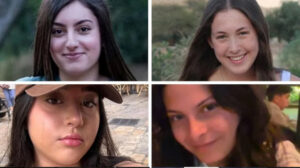Hamas is preparing to release today four Israeli female soldiers held hostage in the Gaza Strip as of October 7, 2023, in exchange for the release of dozens of Palestinians held in Israel; this is the second such exchange provided for under the Gaza Strip ceasefire agreement.
Almost a week after the ceasefire, which is generally being observed, was implemented, the Palestinian Islamist movement yesterday released the names of four young women, aged 19 to 20, whose release is scheduled to take place today.
Israeli Prime Minister Benjamin Netanyahu’s office, for its part, confirmed that it received the list through the countries mediating the sides’ indirect negotiations.
The Hostage Families Forum, which was waiting for the relatives to be informed, expressed its joy after the process was completed in view of the imminent release of the four women – Danielle Gilboa, Karina Ariev, Liri Albag and Naama Levi – “after 477 days in captivity.”
They were fulfilling their military obligations and performing duty patrolling the Gaza Strip when they were kidnapped on October 7, 2023, during the unprecedented assault by Hamas militants on southern sectors of Israeli territory.
The number of Palestinian prisoners expected to be released in exchange was not disclosed. The prison service said some would be taken to the Gaza Strip and others to the occupied West Bank.
“The al-Qassam brigades and other organizations (…) will release the four prisoners on Saturday” and entrust them to the International Committee of the Red Cross and Red Crescent,” a source in Hamas told the Agence France-Presse on condition of anonymity.
According to Palestinian sources, the releases are expected to take place soon, in the morning.
They come as part of a ceasefire agreement that went into effect Sunday after more than 15 months of war, the first phase of which is expected to last six weeks.
In this first stage, in theory, 33 Israeli hostages will be released in exchange for the release of some 1,900 Palestinian prisoners held in Israeli jails.
Three young Israeli women held hostage in the Gaza Strip were released on January 19 in exchange for the release of 90 Palestinians, most of them women and children. Remaining after this exchange are 26 Israeli hostages awaiting release in the first phase of the agreement.
All the names have been made public, but with no chronological order of release, plunging the hostages’ families into doubt and unbearable anguish.
The Hamas assault on southern sectors of Israeli territory on October 7, 2023, led to the deaths of 1,210 people on the Israeli side, mostly civilians, according to a French News Agency count based on official data. Of the 251 people abducted, 91 remain in Gaza, of whom 34 are dead, according to the army.
Others have been announced by Hamas as killed, but this has not been confirmed by the Israeli side.
“Bring home all the hostages, the living and those who are unfortunately dead,” Zahiro Shahar Mor noted, insisting that all must be released from the first phase, during a new pro-hostage demonstration last night in Tel Aviv.
“This is our last chance,” the hostage relative added, as many in Israel fear that Mr Netanyahu’s government will resume military operations in the Gaza Strip once the first phase is completed.
In retaliation for the 7 October 2023 assault, Israel launched large-scale military operations in the besieged enclave, which killed at least 47,283 people, the majority of them civilians, according to Hamas health ministry data. The operations also caused a humanitarian disaster.
The ceasefire agreement in the tiny coastal area that has suffered untold destruction is generally being respected, with some exceptions.
But as thousands of forcibly displaced Gazans are eager to return to their homes, many find nothing but rubble when they do. “We have nowhere to pitch our tents because of the disasters,” said Thekra Kasem, a displaced woman.
The truce, however, allowed thousands of truckloads of humanitarian aid to enter the small enclave before a week had passed.
Israel also demanded yesterday Friday that the UN agency for Palestinian refugees, which it accuses of being eroded by Hamas, end its activities in Jerusalem on January 30.
The demand, made through a letter from the Israeli ambassador to the agency to the secretary-general, follows two laws that have targeted the UN Relief and Works Agency for Palestinian Refugees in the Near East and raises concerns about the future of its work (health, education) in the Gaza Strip and the occupied West Bank.
UNRWA head Philippe Lazarini denounced the Israeli government’s decision via X, warning that it could “sabotage the ceasefire in the Gaza Strip, erasing once again the hopes of people who have experienced unspeakable suffering.”
Ask me anything
Explore related questions





